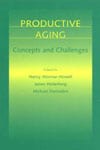Old age has been historically thought of as a period of frailty and dependence, yet studies show that with the help of advances in health and medicine, current populations will live longer and remain healthier than previous generations. As average life expectancies rise, traditional concepts of retirement need to be reconsidered on all levels—from government policy to business practice to individual life planning. In this volume, leaders in the field of gerontology explore these changing conditions through the concept of “productive aging,” which has been developed by leaders in the field to promote older adults’ contributions to society in social and economic capacities. Productive Aging: Concepts and Challenges treats the implications of productive aging for the discipline of gerontology and for society in general. The first section defines the principles, historical perspectives, and conceptual frameworks for productive aging. The second section takes a disciplinary approach, treating the biomedical, psychological, sociological, and economic implications of a more capable older generation. The third section considers advances in theories of gerontology, and the fourth section suggests future directions in practice, theory, and research.
Project: Productive Engagement of Older Adults: Effects on Well-Being
Citation
Morrow-Howell, N., Hinterlong, J., & Sherraden, M. (Eds.). (2001). Productive aging: Concepts and challenges. Baltimore, MD: John Hopkins University Press.
